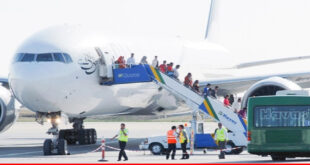The introduction of the new national aviation policy is timely considering the fact that Pakistan has a negative growth of its aviation industry. In contrast to other countries in the region, aviation sector’s contribution in Pakistan was below 0.01 percent. Countries like India, Malaysia, Philippines and Thailand aviation sector’s contribution ranged between 1.5 percent and 9.0 percent. Only 8 percent of the 180 million Pakistani populations have using air travel means.
The future of the much-delayed National Aviation Policy has been marked with anxiety due to various procedural intricacies. The federal government has failed to launch the fresh policy on commercial aviation despite the lapse of around two years. The National Aviation Policy was launched in 2000. It had started formulating a new National Aviation Policy since assuming the charge of the government in June 2013.
Tax relaxation
Certain proposals in the draft National Aviation Policy 2015 have drawn strong reservations from the security establishment as well as from the civilian government departments involved in the airport management, on account of which, the policy could not be launched as yet. The key reason the quarters concerned are strongly opposed to the National Aviation Policy launch in its present form. Several departments, respectively headed by military and civilian authorities, are involved in the airport management and their performance would be diminished if a central authority or Chief Operating Officer is assigned at every airport to run the affairs on a centralized basis.
At present the summary on National Aviation Policy launch awaits the Federal Cabinet’s approval, following which; it is to get final approval of Prime Minister Nawaz Sharif in order to be launched. There are certain issues involved. It needs to be made sure before launching this kind of important policy that all the pros and cons are thoroughly looked into. The government has directed to present the National Aviation Policy, which has already taken huge time in formulation, in the Economic Coordination Committee of the Cabinet for consideration.
The government has asked the Federal Board of Revenue to sort out tax-related matters in the proposed national aviation policy in order to facilitate its early implementation. The government stresses on relaxation in the overall tax regime, deemed essential to encourage growth of the aviation sector. The government appreciated the initiatives by the Aviation Division and directed that the Policy document may be presented to Economic Coordination Committee in due course for consideration. The Policy, when it was finally carried out, would help growth of aviation sector in Pakistan and contribute to strengthening of the economy. In this context the government will engage International Finance Corporation as the transaction adviser.
One of the key features of National Aviation Policy 2015, according to sources, is that it envisages the appointment of a central authority in the form of Chief Operating Officers at the airports by replacing the existing set up of airport management. A new structure, supervised by Chief Operating Officers, will be introduced at important airports. All agencies like Customs, Anti-Narcotics Force, Airport Security Force and Immigration will report to the Chief Operating Officer. A new structure, supervised by Chief Operating Officers, will be introduced at important airports. All agencies like customs, Anti-Narcotics Force, Airport Security Force and Immigration will report to the Chief Operating Officers.
All stakeholders including airlines, flying clubs, charter operators, cargo operators, ground handling agencies and general aviation were consulted in the process. The policy recommends tax-free investment in aviation and calls for outsourcing of all major airports including Lahore, Karachi and Islamabad, landsides and international buildings to prominent foreign companies. The policy also seeks to exempt lease of aircraft from duties and taxes to encourage airlines to increase their fleet.
The new policy will aim at promoting professionalism in the aviation sector through public-private partnership. The Policy envisaged strengthening Pak Civil Aviation Authority and incentivizing aviation business in Pakistan. Public-private partnerships would be introduced for airport operations, management and development.
In order to enhance regulation of aviations services paid up capital requirement was being enhanced for airlines coming into business. Paid-up capital for the airlines has been raised to Rs500 million from the current level of Rs100 million.
Saving of expenses
Minimum number of aircrafts required for domestic and international operations was also being reviewed. The New Aviation Policy hinted at outsourcing management of landside and terminal buildings to known international companies engaged in airport business through a transparent process at major airports. Private investment would be encouraged for overall promotion of the aviation sector.
The policy also recommended developing quality repair and maintenance facilities in the country to save huge expenses on seeking such services abroad. The investment in the sector would not only generate revenue but also create a large number of job opportunities and thus help alleviate unemployment. The special attention has being paid to hospitality. It ensures that those visiting Pakistan have a pleasant experience.
The new aviation policy, currently awaiting the government’s approval, foresees wider participation of the private sector, outsourcing of major airports and tax breaks for start-up airlines. The National Aviation Policy 2014, awaiting the cabinet’s nod, will also allow the Aviation Division to have control over various agencies operating at airports in a bid to facilitate quick passage of passengers. The policy will recommend outsourcing airports starting in northern cities like Lahore. Control of private investors will be limited to terminal buildings, car parking and related facilities — not air navigation.
In financial year 2013-14, government collected Rs1 billion from 19 aircraft, which were leased by Pakistani air carriers. It has been proposed to waive taxes on import of equipment and machinery for start-up operations at green-field airports. Airlines will be allowed to operate aircraft on wet lease for 180 days, an increase from the current limit of three months. But new airlines will be required to have at least five jets before starting operations. Right now, the Civil Aviation Authority (CAA) allows airline to operate with a minimum of three aircraft. Under the new policy, airlines will not be allowed to induct planes, which are over 12 years old. Airline bringing a 12-year-old jet could use it for another six years.
It has also been proposed that the CAA invest Rs1 billion in acquiring lightweight aircraft, which could then be leased to flying clubs. This will help train pilots for Pakistani market and foreign airlines. The policy has made it harder for financially weak businessmen from entering the business.
Unilateral open sky policy
The level playing field has been proposed to be provided by pursuing a unilateral open sky policy with SAARC, ASEAN and other Far-eastern countries. The open sky policy with other countries is proposed to be on the basis of reciprocity and national interest. The open sky policy for cargo has been recommended to be continued with designated foreign airlines based on traffic rights.
The release of a draft National Aviation Policy after a gap of 14 years is a positive development, especially because the new policy has been developed through a comprehensive process that involved the study of similar polices of many relevant countries, the global trends and current best. Overall, the proposed policy is a masterly attempt. The few areas of neglect need to be addressed to make the policy more comprehensive. The government had availed services of all the stake holders, aviation experts and top universities around the world. They had studied the aviation policies of Austria, Singapore, China and Canada and also availed the expert opinion and help of PHD professors.
 PAGE Blog Business Weekly Magazine
PAGE Blog Business Weekly Magazine

